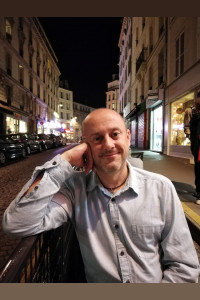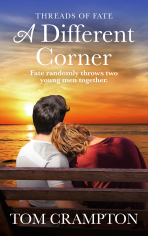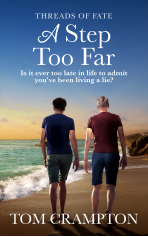Fate throws two young men together. Can they overcome their troubled pasts and form a relationship built on trust?
Most people would be jealous of Christopher, a thirty-year-old gay man living in the beautiful city of Bath, but he is secretly unhappy. His parents died years ago, and ever since he has been scared to form close relationships, preferring to stick to one-night stands.
One day, Christopher spies a young man at Paddington Station and admires him from afar. By chance, the object of Christopher’s fascination, Daniel, ends up sitting opposite him on his journey. After they part, Christopher assumes they’ll never meet again, until he joins a friend for a drink and encounters Daniel once more. They seem destined to meet, but each has a background that makes it hard for them to trust each other. Will they be able to take a bold step into the unknown together, or will their relationship falter before it’s even begun?
General Release Date: 19th March 2024
Paddington Station was not designed for comfort. The roof was partly open to the elements so the temperature inside mimicked the outdoors. The plastic bench upon which I sat was pitted with darkened scars caused by stubbed-out cigarettes. Straight ahead, commuters gathered beneath the board detailing arrivals and departures, looking up at the clicking panels. Most had just come in from the rain and were shaking out umbrellas, fluttering like the pigeons in the rafters above. Beaded raindrops ran down faces, and people frantically searched their pockets for tickets.
He stood out to me in the midst of it all, as if he were awash with colour in a monochrome world. But judging from the flat expressions on the faces all around me, nobody else was as dazzled, and I was alone with my discovery.
He was thin and young, maybe in his mid-twenties—it was hard to tell. He wore a grubby blue shirt and black jeans, creased and well-worn. A battered rucksack hung off his back. His pale skin accentuated the shadows of exhaustion under his eyes. His unwashed, shoulder-length blond hair hung over the sides of his face, framing it like a portrait. He glanced up at the board then strolled to a bench a few metres away, cupping his chin as he leant forward to sit, elbows on his knees. I wanted to look at him, to capture an image of him, and I had to move my head repeatedly as I tried to avoid the commuters who invaded my line of vision. Then I tore my gaze away. What if he caught me staring? A few moments later I dared to look again. He was lost in a private dream. The sight of him tipped me sideways. A mere glimpse sent my stomach fluttering. Was it primal animalistic lust, or had something else about him awoken a desire deeper within me? Whatever it was, he had struck a chord.
A brusque voice from the speakers above announced that the 14:48 for Bristol was about to leave. Because I had spent the past fifteen minutes in a reverie over a stranger, I had moments to reach the platform. I wanted one last look, but he had gone. As I dashed towards the train, the engine’s roar warned me that I was cutting it fine. I jumped into the nearest carriage and made my way out of first-class, through the aisles, until I was in my rightful place. A huddle of passengers waited as an elderly man struggled with his luggage, but nobody was helping him. He had a fierceness in his expression as he tried to retain his dignity. As I approached him, I offered to help, but he declined, so I went through to the next carriage where I found two empty seats.
There was a newspaper wedged down the side of one armrest, so I pulled it out and set it on the table before resting my coat and bag on the empty seat opposite, hoping nobody would sit there. The paper was folded open at a half-completed crossword, so I fetched a pen from my bag and looked at the unfinished clues. “Six across, what we ‘all are architects of’ per Longfellow, four letters.” As I thought about this, a bag brushed against my shoulder. I didn’t bother looking up.
“Is this seat taken?”
I waved with some irritation to signal the place was free and grabbed my coat and bag to clear the space. As I glanced up, my heart skipped a beat. Jerking nervously, I banged my knee and dropped my pen. It rolled under the table, and in a way that seemed no bother at all, he retrieved it from the floor.
“Thanks,” I mumbled.
The whistle blew and the train shuddered forward, the engines increasing in intensity. As we picked up speed, slatted rays of watery sunlight filtered through the diesel-grimed windows of the station roof overhead. I filled in the squares with the word “fate.”
* * * *
I had lived in Bath my whole life and never felt the need to stray. I was lucky to call such a beautiful city home, and I belonged there. Although it was small, there was something comforting about walking through the centre only to bump into someone I knew at any corner.
One of my earliest memories was of when my mother had first taken me to the library when I was five. There was something about that huge room that mesmerised me, the thought of all the words just waiting, ready to be devoured by my hungry mind. She held my hand as we approached the double doors, the excitement running through me as I spied the turnstile that led into the room beyond.
Behind the desk was a kind-looking lady, white hair piled high, half-moon glasses swinging from a chain around her neck. She smiled at me as my mother asked for my first library card. The librarian wore an owl-shaped brooch, its stones reflecting the light as she prepared the card for me. She explained how I could borrow any book, but I must care for it and return it on time.
This responsibility had weighed heavily on me, and, from that moment on, books had always been a treasure. Visiting the library became a ritual, and the librarian said I was their most loyal visitor. But one day, when I had just turned sixteen, she wasn’t there. Knowing I would never see her again, I changed my route home so I could walk by the cemetery, still a loyal visitor. To this day, whether I was browsing in a library, a bookshop or even my own shelves at home, I could still feel my choices guided by her—she had always known what I needed to read. She had provided me with the very best literary education.
While my mother encouraged me to read, my father wanted to make sure I didn’t stay in my room all day with my nose in a book. At weekends or on those balmy seventies summer evenings, we would kick a ball around Victoria Park, or play cricket or Frisbee. I loved spending time with him. He would talk to me like I was his age, telling me about his job and plans for the future. We often walked along the Royal Crescent, my hand engulfed in his warm grip, the calluses on his fingertips from years of gardening rubbing against my skin. He told me stories, inventing lands where people had wings or lived underwater, where animals talked and people never died. We often circled the park for hours, lost in tales of secret worlds beneath our feet, hidden doorways to faraway places. Not all the stories had happy endings, but that didn’t matter. When I was older, I had asked him why he hadn’t written the stories down. He had just shrugged and said they were for me and me only.
In the summer of ’81, when I had just turned eighteen, I started working at the Bath Bookshop, where I still worked now, twelve years later. I was truly a part of the fixtures and fittings. My parents were annoyed that I didn’t want to go to university, but realised I could not be dissuaded.
Even though the shop had three floors, only four of us worked there. Arthur, or “Art” as he preferred, was the owner. He had a high-pitched voice that belied his short and tubby appearance. People often gave him a second glance when he spoke. My one gripe with him was that he was far too nice. He could be over-benevolent and go a little too much out of his way for others. If any of us wanted time off, he gave it without question. Or if we were running low on cash for the month, he opened his wallet to tide us over until payday.
My other two colleagues, Ben and Tabitha, had come to work at the shop independently, then fallen in love. They had been living together for nearly eighteen months, which, by Art’s reckoning, was a miracle.
Working with a partner looked suffocating. There had been far too many occasions when Art or I had to flee to a different part of the shop because the couple were in the middle of one of their heated whispered disagreements. Ben and I often went out after work for drinks, me for the company and him to escape for a while.
At thirty-five, Tabitha was older than Ben, but she looked younger than he was, as his strong face and high cheekbones aged him a bit. Her make-up was always applied with artistry and her hair styled in a different way every day, into twists and coils, or with a headscarf or polka-dot hairband. Since she was always chatty and effervescent, people confided in her, even from her position on the ground-floor till, the figurehead on the prow of the Bath Bookshop.
It had been two months since I had taken that train back from London, and only now did I want to talk about it, so I asked Ben if he wanted to go for a drink after work. He had argued with Tabitha that afternoon in the Military History section and was happy to escape for an hour. We walked past Bath Abbey and across the unfairly named Bog Island towards our local. The pub with its wooden panelling and green velvet upholstery had the vague air of a gentlemen’s club, but without the aloofness. An older man nursed a large brandy at the bar. We were the only other customers. Ben and I took our usual spot at the front of the room by a large bay window.
“I don’t understand her anymore. You’ve got the right idea sticking to the fellas,” Ben said forlornly.
“Well, it’s not a choice, but I know what you mean. Anyway, even though you and Tabitha argue a lot, at least you have each other.”
“Sorry…”
I shrugged it off and said, “It doesn’t matter. I quite like the peace and quiet of being single.”
“Maybe though, just, y’know, try and get out a bit more, though? Instead of staying cooped up in your flat. Like a chicken.”
I played with the rim of my pint.
“You have an elegant way of getting to the point. But, actually, I think I have met someone…”


















